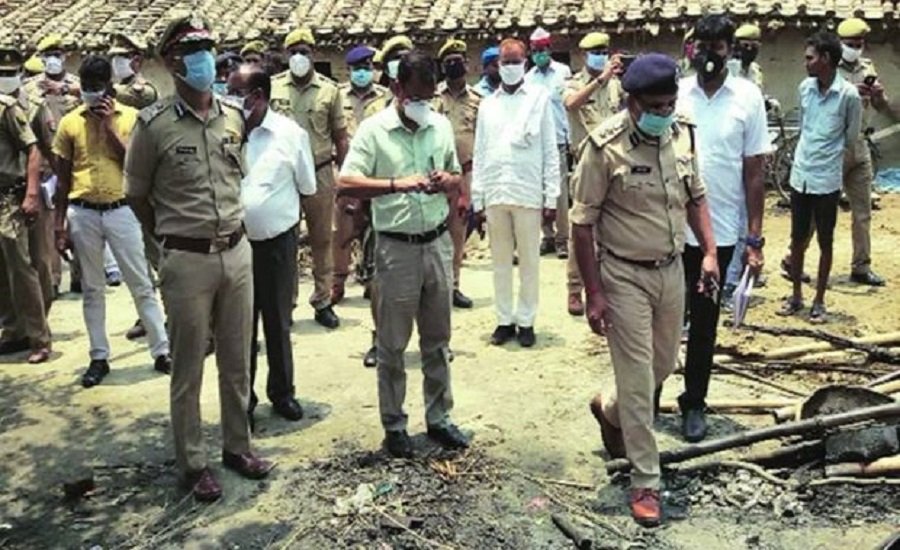
Shaheen Nazar | Clarion India
A CLASH between Dalits and Muslims in a village in UP’s Jaunpur district last week has left the area communally polarised, thanks to the extra-ordinary interest shown in the case by Chief Minister Yogi Adityanath. It has also given a new opportunity to the Hindutva forces and a section of media to corner Dalit leader Chandrashekhar Azad who has been trying to bring his community and Muslims closer and form some sort of an alliance.
An altercation between Dalit and Muslim boys escalated into a full-fledged clash that resulted in injuries on both sides and burning of 10 huts of Dalit families at Batheti village in the district on the night of June 9. Dalits have blamed it on Muslims but Muslims deny their involvement.
Police arrested 37 people, all Muslims, after filing an FIR against 57 named and up to 25 unnamed persons. The action was taken on a complaint filed by Dalit community. It is alleged that the police refused to listen the complaints of the Muslim community. Fearing arrests Muslim youths have fled the village. Police have announced Rs 5,000 each on their heads and deployed force in the village.

Chief Minister Adityanath, claiming that atrocities against Dalits would not be tolerated, ordered invocation of National Security Act and Gangster Act against all the accused. He also directed the district administration to provide houses to the affected Dalit families under the CM Awas Yojana and a compensation of Rs 1 lakh each family.
But the promptness shown by Adityanath and his administration did not please the Dalit leadership. Azad, who heads Bhim Army, an Ambedkarite and Dalit rights organisation, saw in it an ulterior motive. “After every atrocity you have to come on the street to press for action against the culprits. But here, the state machinery has become proactive. A strict action has been taken because it fits into the hidden agenda of RSS,” Azad said in a video message to his people.
Azad also listed some recent anti-Dalit incidents in which no action has been taken. He referred to the alleged rape of a Dalit woman in the same Jaunpur district where the chief minister was showing so much concern for the Dalits. He also mentioned another incident of Qannauj, also in UP, where a Dalit official was thrashed by a BJP MP. The culprits in both the cases remain free, he said. Those who are empathising with the Dalits of Batheti village are doing nothing but “shedding crocodile tears”, he alleged.
They are the same people who speak against Dalits’ constitutional rights day in and day out. “But today why are they taking your side. You must think over it,” he told his community members. He demanded action against those giving communal colour to the incident. “I am working for the unity of the weaker sections. Some people are conspiring to break this unity,” he said.
RSS mouthpiece Organiser, right-wing news portal OpIndia, Hindi daily Navbharat Times and several other publications criticised Bhim Army chief for going against Dalits. The Jaunpur incident has prompted opposition parties to send their delegations to the village. During last few days Congress Party, Samajwadi Party, Ulema Council and Bhim Army have sent their representatives to the village.
Leaders of Ulema Council, a political party active in eastern UP, have said the police were raiding Muslim houses and misbehaving with women folks. The prize money announced on fleeing Muslims was preventing them from returning to their homes. They alleged that the police had done this with an ulterior motive of establishing their criminal record for future actions.
A five-member delegation sent by Jamaat-e-Islami reported that one-sided police action has left Muslims of the village terrorised. A report issued by the delegation says that besides this particular incident, there have been four similar incidents involving Dalits and Muslims in the region during last one month.
In all the incidents the patterns followed are same: first a clash takes place between Dalits and Muslims; then certain people become active; they start visiting the Dalit localities, hospitals and police stations; finally, police files cases against Muslims, arrest them and implicate them in crimes such as rioting, attempt to murder and breach of peace.

